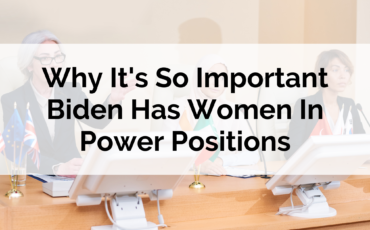When it comes to difficult conversations, there is no bigger topic than the challenge of achieving gender equity. One of the changes that must occur is an increase in women when it comes to political representation. It will take 95 years to close the gender gap in political representation, with women in 2019 holding 25.2% of “parliamentary” (lower-house) seats and 21.2% of ministerial positions (Gender Gap 2020 Report).
Walk Your Talk
One of the promises from the Biden-Harris ticket was to create an administration that reflected America. Biden has started to make good on that promise. Biden has nominated women to five of 15 Cabinet posts, or 12 of the 25 cabinet or cabinet-level roles, exceeding by one the records set by Bill Clinton and George W. Bush. Both presidents included four women in their initial second-term Cabinets, as did Barack Obama in his first. Trump only had six women serve concurrently in cabinet or cabinet-level positions.
Move the Bar on Norms
The more change we see, the more citizens, leaders, and organizations will realize that change can occur and is expected. Once a new norm is established, then true change will happen. Women need more male advocates AND access to the informal networking that occurs (where business happens through connections, like the golf course). When Biden chose Kamala Harris as his running mate, as well as choosing women for 5 of 15 Cabinet positions, this established a new norm of inclusion that will be harder for future leaders to go below.
Diversity has a Ripple Effect Abroad
Biden’s Cabinet is one of the most diverse in US history and shows world leaders that the US takes gender equality seriously. In addition, Deb Haaland would be the first Native American Cabinet member for the Interior Secretary, should she be confirmed. Pete Buttigieg is the first openly gay man to lead a Cabinet department as Secretary of Transportation. Four of Biden’s Cabinet nominees identify as Latino or Black. A diverse cabinet can provide more insight and information to a leader and also reflects the diversity of America. Linda Thomas-Greenfield, a former career diplomat, earned confirmation to be US ambassador to the United Nations, on a 78-20 vote. Avirl Haines has been confirmed to the Director of National Intelligence seat as well as Janet Yellen to Treasury. As of the end of February, only 9 of Biden’s 23 Cabinet members have been confirmed. When other countries see gender equality matters, there is an uptick not only in their own government but also in the amount of women ambassadors sent as well.
People are Paying Attention and Demanding Change
In early December more than 1,000 influential Black women signed an open letter to President-elect Joe Biden and Vice President-elect Kamala Harris, urging their transition team to consider — and appoint — more Black women to hold positions in Biden’s Cabinet. “Just as Black women and Black Americans were key to your election in November, we are key to the success of your Administration and the implementation of your vision. Our community must see ourselves reflected in key leadership positions in recognition of our importance,” the letter added. Black women played a fundamental role in securing Biden’s electoral win, with 90% of Black women voting for Biden in November, according to CNN’s exit polling. And Black women, led by Stacy Abrams, were particularly pivotal in Biden’s victory in Georgia — a state that hadn’t gone for a Democrat since 1992.
Accelerating Change from the Top
When it comes to achieving global gender parity, the numbers have regressed. It will take 257 years before gender parity can be achieved. Change starts at the top. Having a cabinet full of diverse views, perspectives, and experiences can drive more relevant policymaking for the Biden administration and potentially help close the gender equity gap in significant ways through policies. The women nominated are qualified and not simply chosen because they are women. The ability for minority groups to see that they have a voice and can influence and accelerate change is powerful. Businesses, nonprofits, all organizations will feel the impact of the choices Biden made as a result of being held accountable by his voters and all Americans.
A few of my favorites:
Jennifer Granholm, Secretary of Energy
Granholm served two terms as governor of Michigan and was first elected in 2002. She was the first woman to be elected governor of the state, and in 2006 was elected with the largest number of votes ever cast at the time for the state, according to her biography page on the state’s official website.
Avril Haines, Director of National Intelligence
Haines is the first woman to serve as director of national intelligence if confirmed by the Senate.
- Haines served as assistant to the president and principal deputy national security adviser to Obama. She chaired the National Security Council’s Deputies Committee, which is responsible for formulating the administration’s national security and foreign policy.
- Haines previously served as the deputy director of the Central Intelligence Agency. Haines was also legal adviser to the NSC. She served as deputy chief counsel to the Senate Foreign Relations Committee while Biden served as chairman.
Marcia Fudge, Secretary of Housing and Urban Development (not yet confirmed)
- Fudge has represented Ohio’s 11th Congressional District since 2008.
- She previously chaired the Congressional Black Caucus. The congresswoman currently chairs the House Administration Committee’s Subcommittee on Elections and the Agriculture Committee’s Subcommittee on Nutrition, Oversight and Department Operations.
- In 2018, Fudge publicly weighed a bid against Nancy Pelosi for speaker of the House, but ultimately threw her support behind Pelosi, who won reelection.
- Prior to running for Congress, Fudge made history as the first woman and first African American to be elected mayor of Warrensville Heights, Ohio. She served as mayor from 2000 to 2008.
Brenda Mallory, Chair of the Council on Environmental Quality
- Mallory is the director of regulatory policy at the nonprofit Southern Environmental Law Center.
- She previously served as the executive director and senior counsel for the Conservation Litigation Project, which supports protection and conservation on public lands.
- During the Obama administration, Mallory served as the general counsel for the White House Council on Environmental Quality. She previously served as the acting general counsel and the principal deputy general counsel at the Environmental Protection Agency.
- Prior to joining the EPA, Mallory was a director at the environmental law firm Beveridge and Diamond.
Be a Noisebreaker,
Jen

